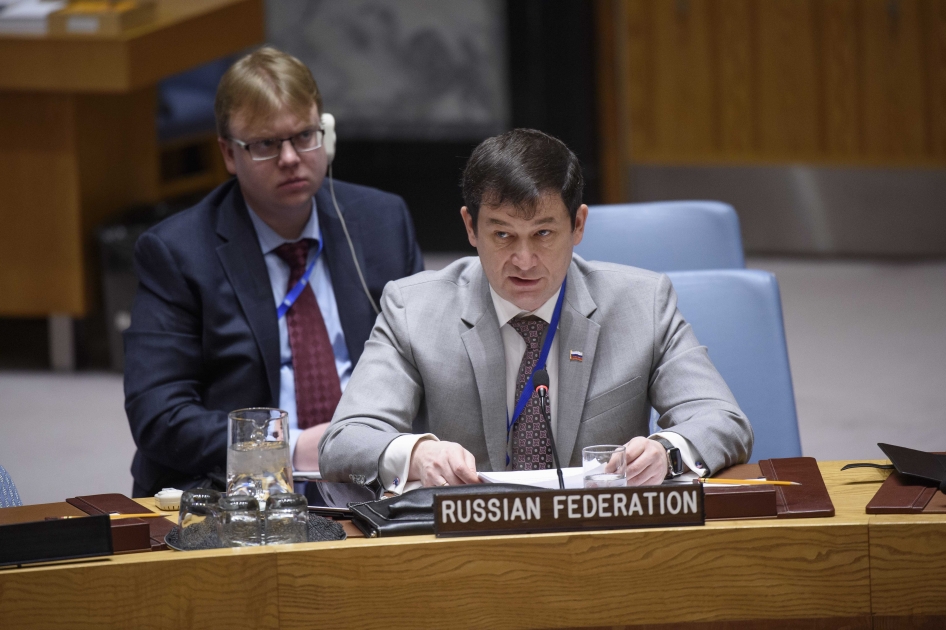Statement by Mr.Dmitry Polyanskiy, First Deputy Permanent Representative of the Russian Federation to the United Nations, at the Security Council on the Sudan and South Sudan
We have taken note the briefing of Ms. Joanna Wronecka, Permanent Representative of Poland, on the work of the Committee established pursuant to resolution 1591 (2005) concerning the Sudan.
We note the overall positive trend in the military and political situation and the settlement of the conflict in Darfur. The security situation is stable. Armed violence is on the decline. Large-scale clashes and intercommunal conflicts have ceased. Refugees and internally displaced persons are returning home.
We see no alternative to the Doha Document for Peace in Darfur as the basis for a political settlement in the region, and we welcome the measures being taken by Khartoum to implement it. The signing on 6 December in Berlin of a preliminary agreement on the resumption of the peace process speaks to the commitment of the parties to achieving a lasting peace in the region through negotiations.
In that context, we were disappointed by the unconstructive negotiating position of Abdul Wahid Al Nur. We have to acknowledge that attempts to woo intransigent actors are damaging to the peace process. We believe that the external sponsors of the Sudanese opposition should be more proactive in urging their protégés to take more realistic positions.
As has repeatedly said here in this Chamber, sanctions are not an end in themselves but rather one of the tools in the Council’s arsenal for advancing peace processes and encouraging political dialogue. The positive developments we have seen in Darfur suggest that the sanctions introduced 14 years ago have already served their purpose.
There is an evident need a clear road map for lifting the Security Council sanctions on the Sudan. In the context of the planned drawdown of the peacekeeping contingent of the African Union-United Nations Hybrid Operation in Darfur, we would like to point out that the previous Chair of the 1591 Committee made the very logical and timely recommendation that easing the sanctions regime should go hand in hand with withdrawing the Blue Helmets. Our experience in Eritrea has shown that when there is corresponding political will on the part of the Western members of the Council, it is quite possible to make substantive progress in lifting sanctions. Unfortunately, we have not seen any of that here so far.
What is more, we are already hearing so-called human rights activists sending signals in support of a de facto toughening of the Council’s sanctions regime on the Sudan by making sexual and gender-based violence a separate listing criterion, expanding the capacity and powers of the Panel of Experts of the 1591 Committee in this area, and linking the eventual lifting of sanctions on the Sudan to a resolution of the problem of sexual violence in Darfur.
In our view, such a transformation threatens to turn on its head the whole point of the Sudan sanctions regime, which was introduced with a view to protecting international peace and security. The initiators of such so-called innovations are not acting based on the trends in the real situation on the ground but on their own narrow national agendas, which are often far removed from the interests of establishing peace in Darfur.
A number of our colleagues today raised the topic of the protests in the Sudan. I would like to underscore that this subject is not related to the subject of our meeting. The objective of these kinds of tactics is clear. It is to create an impression that the Security Council has a mandate to discuss a purely national Sudanese issue in the context of the sanctions regime.
I want to emphasize that this is no way corresponds to reality and nobody should be misled on the matter. In general, it is hard to shake the feeling that raising the issue of anti-Government protests in Khartoum, which in itself constitutes interference in the country’s internal affairs, comes under the rubric of geopolitical engineering and the West’s well-known policies aimed at replacing regimes that it does not like. We all know what that led to in Libya, South Sudan and various other countries.
We do not wish to hold the Security Council and the 1591 Committee hostage to our Western colleagues’ geopolitical agenda.
In conclusion, I want to once again underscore that any Security Council sanctions regime must be reviewed so that it can adapt to the realities on the ground. It was with that in mind that we agreed on resolution 2400 (2018), which clearly established the importance of holding such reviews regularly. We hope that concrete parameters for lifting sanctions will soon be developed. They are obviously long overdue.
